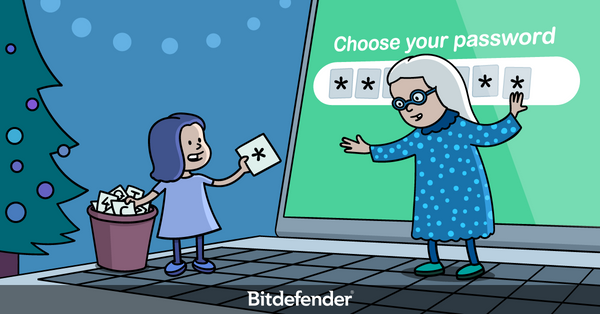The Holiday Guide to Tech Support: Password Advice and Best Practices

New research shows that 60% of consumers are exposed to cyber threats, while only one in 10 can be deemed “secure” in today’s threat landscape. Use this guide to assess your family’s security posture as you gather for turkey this holiday season.
Bitdefender ran a study this year to analyze online behaviors among consumers, from password reuse to the number of online accounts and services, to sharing of account details and lack of security services on their devices. We found that almost 60% of consumers were “exposed” and just 11% could be described as “secure” in terms of their cybersecurity practices.
Half of those surveyed said they use a single password for all online accounts, and nearly a third have just a few passwords and reuse them for multiple accounts. 27% percent use simple passcodes, such as 1234, to lock their mobile phones and 11% don’t lock their mobile phones at all.
Finally, 46% say they dislike choosing new passwords for each new account and 38% dislike using multi-factor authentication.
Set a strong password
Hackers deploy dictionary attacks and brute force techniques to prey on weak passwords. To make your password hard to guess, use uppercase and lowercase letters, numbers, and special characters (%$^#& etc). The minimum number of characters by today’s standards is eight. However, longer is better.
Use separate passwords for different accounts
According to our research, consumers subscribe on average to around eight online platforms, such as YouTube, Reddit, Instagram, TikTok, SnapChat, WhatsApp, etc. Keeping track of multiple passwords may sound tedious, but it’s worthwhile if you consider the consequences of a data breach. Using the same password across accounts means that if one platform gets breached, your password gets exposed not just for that account, but for all your accounts. Whatever you decide to do, at least don’t use the same password for your bank account too.
Bitdefender Digital Identity Protection continuously monitors your personal information and alerts you in real time in case of a breach.
Use 2FA on every platform that offers it
Two-Factor Authentication, abbreviated as 2FA, is an additional security layer designed to protect us against account takeover. Even if your password somehow gets stolen, bad actors still can’t break into your accounts without the one-time-password sent to your email or phone. So be sure to enable 2FA on every platform that offers it. Nowadays, the vast majority of them do.
Use a password manager
It’s true that it’s not easy to remember a different password for each online account. But let’s not forget that password managers abound these days. Whether you’re a hardcore Internet user or you simply prefer convenience, Bitdefender’s Password Manager helps you keep track of your passwords, protects your privacy, and lets you browse securely. Using a single master password to access your credentials, the Password Manager in Bitdefender Total Security makes it easy to keep your passwords safe in a virtual wallet. But it does much more too. It can also generate unique, secure passwords for you, it secures your credit card information and other sensitive data, and it lets you autofill online forms.
To help you get device care over with and get back to the dinner table, cyber-security experts at Bitdefender have prepared a maintenance checklist that you can download below:
Download the printable checklist here
Stay safe!
tags
Author
Filip has 15 years of experience in technology journalism. In recent years, he has turned his focus to cybersecurity in his role as Information Security Analyst at Bitdefender.
View all postsRight now Top posts
How to Protect Your WhatsApp from Hackers and Scammers – 8 Key Settings and Best Practices
April 03, 2025
Outpacing Cyberthreats: Bitdefender Together with Scuderia Ferrari HP in 2025
March 12, 2025
Streamjacking Scams On YouTube Leverage CS2 Pro Player Championships to Defraud Gamers
February 20, 2025
How to Identify and Protect Yourself from Gaming Laptop Scams
February 11, 2025
FOLLOW US ON SOCIAL MEDIA
You might also like
Bookmarks







